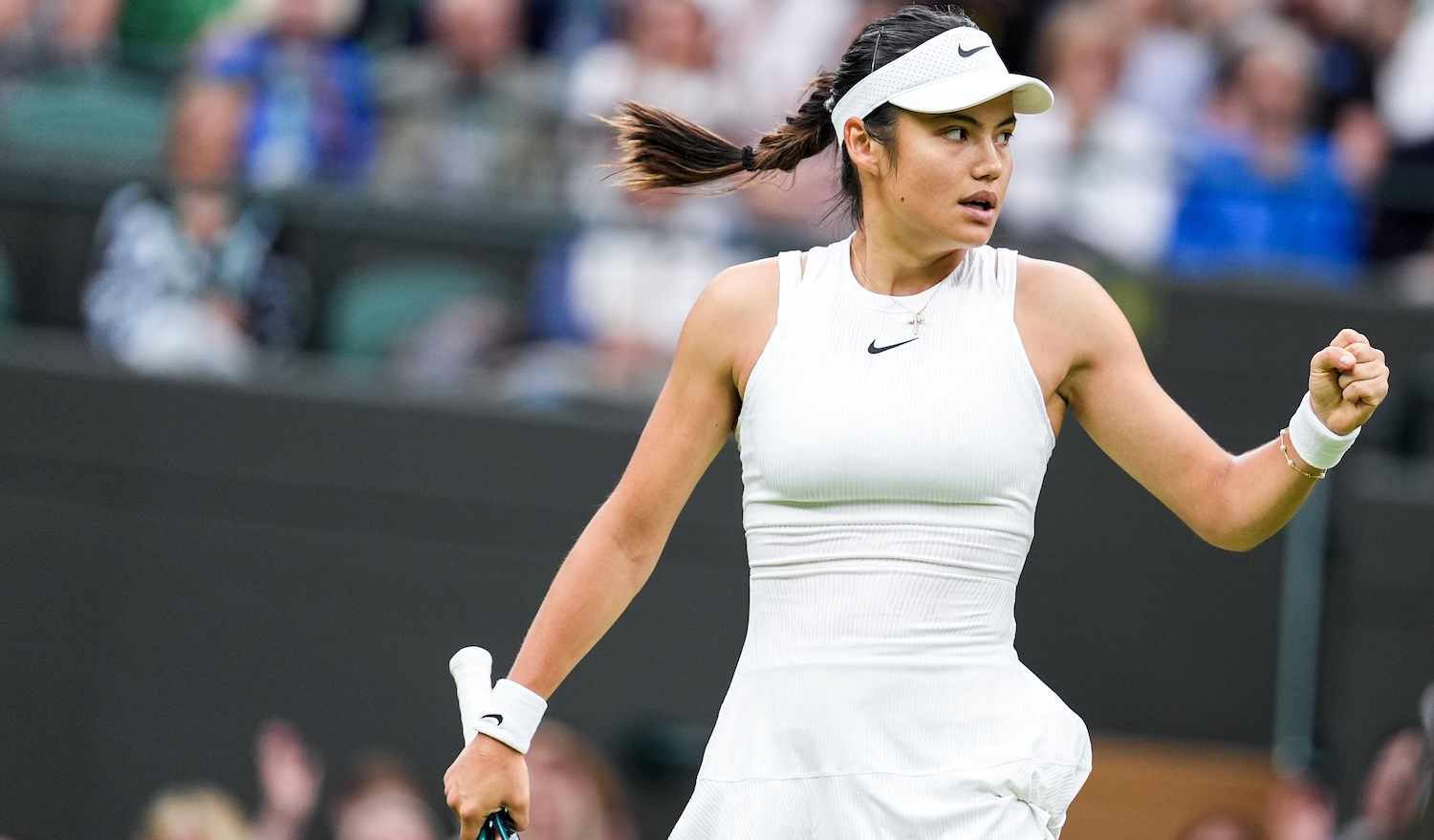Emma Raducanu, a player whose career has been defined by extremity, had a fittingly extreme Wimbledon. The tournament was the orbital center of her 2024 season, as she eschewed the French Open despite some intriguing clay results in order to be more fully prepared for the grass-court season. Doing so naturally invited pressure, as did her choice to play mixed doubles alongside former bipedalist Andy Murray, and she played all of her matches in the two biggest stadia at the All England Club. With the defending champion lasting scarcely longer than an hour, the rest of the draw crumbling, and Raducanu confidently swatting aside experienced players, she was beginning to feel like the protagonist of the tournament. Right up until she dropped out of the match with Murray and got stomped by Lulu Sun. Naturally, Sun made it into the draw via qualifiers. What sort of upset is that, if not extreme?
The tantalizing question with Raducanu hasn't been about the far ends of her performance, but rather what a normal tournament for the 21-year-old could possibly look like. Nothing about her career has ever been normal: the U.S. Open run as an unseeded 18-year-old made her a star overnight, with fame too bright and expectations too high for a career that was only sprouting. The difficulty of her sudden rise was exacerbated by a stalker whose harassment was so severe he was given a five-year restraining order. If you've seen someone waltz through the U.S. Open without dropping a set, notch their first top-10 win three years after winning their first Slam, and undergo simultaneous surgeries on three of her four limbs, you have seen them at their best and worst. What's made Raducanu so fascinating is how rarely she's shown anything in between those poles for longer than weeks at a time.
The riskiness of Raducanu punting on the French Open, especially after taking clay demigod Iga Swiatek to her limit for a set at Stuttgart, made itself apparent instantly, when Raducanu was drawn across from Ekaterina Alexandrova, world No. 22. Alexandrova got sick and dropped out, and though Raducanu got past lucky loser Renata Zarazúa, it was a tricky test of Raducanu's problem-solving abilities. She'd spent days preparing to face a power player only to get matched up against a someone whose loopy, cheeky game depends on getting opponents off balance. It was as if she'd shown up to a driving test and been presented with a bicycle. After the first set went to a tiebreak, Raducanu seized the initiative and bullied Zarazúa off the court, taking inspiration from England's last-gasp win against Slovakia to win ugly. "It doesn’t need to be beautiful, it doesn’t need to be perfect," she said. Winning the match on a pair of drop shots was Raducanu doing a wheelie across the finish line.
While the Zarazúa slog left plenty of questions about whether Raducanu could truly contend, her next two wins answered them. Belgian Elise Mertens is a capable defender who hits it flat and forces her opponent to beat her, which is what Raducanu did, 6-1, 6-2. She showed the sort of player she is at her best, sending Mertens scrambling backwards with her concussive backhand and applying consistent pressure with her hard, efficient serves, especially out wide. She was also clearly having fun out on Court 1, which I think matters. More than the steady backhand, what's striking about Raducanu is the way she feels the game; her shot-picking abilities, her problem-solving, her persistence in high-stress situations. When she's flowing, you can see a more fully realized version of Raducanu congealing from the turbid jumble of her short career.
One round later, Raducanu faced Maria Sakkari, the tournament's ninth seed. Sakkari and Raducanu have only played once before, when Raducanu dispatched her in the 2021 U.S. Open semifinal. Sakkari managed the same number of games (five) as Raducanu ran back the best parts of her Mertens performance. Sakkari is more of a crusher than Mertens, and while she piled up an uncharacteristic 31 unforced errors, she also backed Raducanu into a corner more than a few times, only to be undone by relentless Raducanu defense. The British player faced seven break points, not only saving all seven, but landing her first serve each time. There she was, slapping that backhand, hitting forehand winners on the run, and showing off her creative point-winning.
The day after Raducanu beat Mertens, she got the call from Murray, and she was jubilant. "At the end of my life, I know I’m going to have that memory of playing Wimbledon with Andy Murray on a home slam," she said. "I really don’t want to let him down. I’m going to be on my best form, trying hard. And I’ll probably be more nervous for that than the singles." That's an unfortunately ominous quote to read in light of what Raducanu would do days later when she walked away from mixed doubles, citing wrist soreness. Murray was understandably disappointed to be denied his final Wimbledon moment, and his mom was pissed. Wrist injuries are among the most ruinous a tennis player can face, as Raducanu knows as well as anyone. Wimbledon organizers threw a nice ceremony for Murray after he and his brother lost in doubles, though that was not supposed to be goodbye. Murray wound up asking the wrong person, who, for her part, probably should have just declined.
Maybe Raducanu herself didn't expect to beat Sakkari, but after she did, seeing the draw wide open in front of her, prioritizing her singles run was totally the right move. It's what I think Murray, a pure competitor, would have done in her place. Lulu Sun had taken down eight-seed Zheng Qinwen, Aryna Sabalenka had dropped out, Iga Swiatek got smoked by Yulia Putintseva, and even Mirra Andreeva had been knocked out. Who wouldn't have allowed themselves to dream in those circumstances, especially having already made a significantly more improbable run? Raducanu saw her opening, and she went for it.
She was right to think she had a shot to hit the quarterfinals with momentum. Instead, she got blown away by a player whose run through the qualifiers and ball-striking skills may have reminded some of Raducanu. Sun went and took the match from her opponent, smacking 52 winners (the most of anyone in the tournament so far) to Raducanu's 18. It was the smothering, fearless tennis of a player unburdened by anything close to expectations. Whether it was her wrist or nerves, Raducanu wasn't as willing to open up her return game and get after Sun's serve, allowing the Kiwi player to wriggle into three break points in the second set. Raducanu saved each of them and fought for the only break of serve in the set to force a decider, despite being more than doubled up on winners in the set (21-9). She's rarely been in a battle like this, and the third set could have been something special had she not turned her ankle in the first game. The energy in the stadium dissipated as if blown away by the soggy London weather, and Raducanu lost the final set, 2-6.
All told, Raducanu's latest comeback was impressive. Making it to the fourth round of Wimbledon is a serious accomplishment, even if she lost to a qualifier. She's shown, for the third time now, that she has the skills to make it this far, and in the two cases where she did not hoist the trophy, she was waylaid by physical maladies. We can learn more from the way she won her first three matches at Wimbledon this year than from either of her two losses at this tournament. She belongs at this level. The hard part will be preventing the need for future comebacks by holding up to the punishment of life on tour. Emma Raducanu is less indeterminant a quantity than she was two weeks ago, and all tennis fans can ask for is that she continues to materialize.






